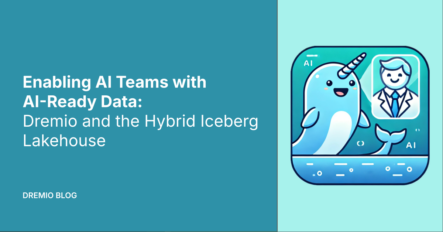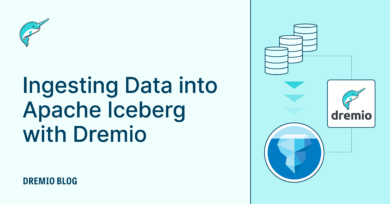11 minute read · October 21, 2024
Enabling AI Teams with AI-Ready Data: Dremio and the Hybrid Iceberg Lakehouse

· Principal Product Marketing Manager

Artificial Intelligence (AI) has become essential for modern enterprises, driving innovation across industries by transforming data into actionable insights. However, AI's success depends heavily on having consistent, high-quality data readily available for experimentation and model development. It is estimated that data scientists spend 80+% of their time on data acquisition and preparation, compared to model building and deployment. This is where Dremio’s Hybrid Iceberg Lakehouse comes into play, streamlining the process and allowing data scientists to spend more time on the high-value tasks of building models and analyzing data vs. acquiring and preparing data. Dremio provides a seamless platform for AI teams to access, prepare, and manage data efficiently, accelerating time to AI insight.
Through a collaborative lakehouse model built on open standards like Apache Iceberg, Dremio equips enterprises with AI-ready data, ensuring smooth data collection, aggregation, description, wrangling, and even data versioning for model testing. This hybrid environment offers AI teams the ability to operate flexibly across cloud and on-premises infrastructures, helping them to optimize AI workflows and future-proof their infrastructure.
AI's Data Challenge: The Need for Readiness
AI teams face several challenges when preparing data for AI and machine learning (ML) models. Unlike traditional analytics projects, AI workflows involve large-scale datasets, complex preprocessing, and frequent experimentation. Many organizations struggle with:
- Scattered data sources across cloud and on-premises environments.
- Data silos that hinder collaboration between data scientists, engineers, and analysts.
- Time-consuming ETL processes required to collect and prepare datasets.
- Complex data environments that slow down experimentation and model testing.
Traditional data management platforms often fail to meet these challenges. AI teams require a platform that supports fast access to real-time data, scalability, governance, and the ability to experiment rapidly without creating excessive data movement. The Dremio Hybrid Iceberg Lakehouse excels in this area by delivering a data environment optimized for AI data prep workloads.
The Hybrid Iceberg Lakehouse Advantage
The Dremio Hybrid Iceberg Lakehouse supports hybrid cloud architectures, allowing enterprises to store, access and analyze data wherever it resides—whether on-premises, in the cloud or across multiple cloud providers. Many organizations have large amounts of data that still resides on-premises or are even re-patriating some of their data from the cloud to on-premises. Having a lakehouse solution that allows AI teams to take full advantage of data both on-premises AND in the cloud is a key advantage of a hybrid Iceberg lakehouse. The Hybrid Iceberg Lakehouse combines the flexibility of open standards like Apache Iceberg and Parquet with a modern SQL Query engine, unified access, and data catalog. This empowers AI teams with a high-performance, cost-effective, and flexible platform for analytics and AI. The Dremio Hybrid Iceberg Lakehouse helps companies prepare AI-ready data and streamline the AI pipeline process.
1. Data Collection and Aggregation
The first step in any AI project is gathering data from various sources, including cloud-based storage, on-premises systems, databases, and other data sources. This process can be challenging for AI teams due to the volume and diversity of the data involved. Dremio simplifies data collection and aggregation by:
- Querying data directly on data lakes without needing to move it into proprietary warehouses.
- Supporting open formats like Apache Iceberg and Apache Parquet, ensuring easy access across environments.
- Integrating seamlessly with a company's hybrid infrastructure, enabling data to be accessed both on-premises and in the cloud.
By eliminating the need for the dependency on complex ETL processes, AI teams can rapidly access large datasets. This allows data scientists to begin accessing and working on data without delays, reducing the time it takes to get from raw data to insights.
2. Data Description and Tagging
Once data is collected, the next step is description and tagging, a crucial process for AI teams to ensure datasets are labeled and categorized accurately for training models. Dremio offers robust metadata management capabilities to simplify this step. Using Dremio's semantic layer and data catalog, teams can:
- Assign business and technical metadata to datasets, improving discoverability and usability.
- Tag data for specific AI projects, ensuring the right data is used for model training.
- Utilize features within the catalog to enforce data governance standards and maintain consistency across projects.
This semantic layer ensures that everyone in the organization—from data scientists to business users—can easily find and understand relevant datasets. Accurate data description and tagging are essential for building trustworthy models and ensuring AI projects align with business objectives.
3. Data Wrangling and Preparation
Data wrangling—the process of cleaning and transforming raw data into usable formats—is one of the most time-consuming tasks for AI teams. Dremio's self-service platform empowers data scientists and engineers to perform complex wrangling tasks efficiently, without depending heavily on IT teams. Key features include:
- Natural language-based queries that allow users to generate SQL queries using simple text inputs.
- The ability to query data in place, avoiding unnecessary data movement and reducing latency.
- Support for collaborative data views that can be built, shared, and reused across different teams.
The Dremio platform reduces preparation time by simplifying data wrangling, enabling AI teams to spend more time on model experimentation and less time on data cleaning. Additionally, the ability to analyze data in real time ensures that AI models are always trained on the latest, most accurate datasets.
4. Model Testing with Git-Like Capabilities
AI teams thrive on experimentation, often testing multiple models in parallel to identify the best-performing ones. The Dremio Enterprise Data Catalog for Apache Iceberg’s Git-like capabilities offer a unique solution for this phase, allowing teams to manage data versions with precision. Here’s how it supports efficient model testing:
- Branching and versioning: Teams can create branches of datasets to experiment on without duplicating physical data, enabling rapid prototyping.
- Instant rollbacks: If a model or data change doesn’t work as expected, teams can quickly revert to previous versions, minimizing disruption.
- Collaborative experimentation: Multiple teams can simultaneously work on the same datasets, with changes tracked seamlessly across branches.
This version control capability mirrors software development workflows, allowing AI teams to manage their data just like code. This approach speeds up model testing by providing a controlled environment where changes can be made and evaluated without impacting production workloads.
5. Seamless Governance and Security in Hybrid Environments
Governance and security are critical components of any AI initiative, particularly in hybrid environments where data spans multiple locations. The Dremio Hybrid Iceberg Lakehouse ensures robust governance while maintaining flexibility, thanks to:
- Role-based access control (RBAC): Ensuring only authorized users can access specific datasets.
- Fine-grained permissions: Controlling access down to the column and row level to protect sensitive information.
- Unified governance: Providing visibility across both on-premises and cloud environments to maintain compliance with industry standards.
With these governance features, AI teams can confidently experiment and develop models while ensuring data privacy, security, and regulatory compliance.
6. Flexibility Across On-Premises and Cloud Environments
The hybrid nature of the Dremio lakehouse solution allows enterprises to operate across both on-premises and cloud environments. This flexibility is especially beneficial for AI teams that require access to large datasets stored across multiple locations. By leveraging Dremio’s Hybrid Iceberg Lakehouse companies can:
- Optimize workloads by allowing organizations to process on-premises data on-premises and not having to move it to the cloud.
- Provide high performance across all environments with Dremio Reflection’s intelligent query acceleration.
- Avoid vendor lock-in by using a lakehouse built on open standards like Apache Parquet and Apache Iceberg.
This open and flexible hybrid approach not only reduces infrastructure costs but also ensures seamless data access, giving AI teams the freedom to work wherever they need to.
Empowering AI Teams with AI-Ready Data
The Dremio Hybrid Iceberg Lakehouse is a game-changer for organizations looking to accelerate AI initiatives with AI-ready data. From data collection and aggregation to description, tagging, wrangling, and model testing, the platform streamlines the AI workflow.
By eliminating ETL bottlenecks, supporting real-time analytics, and enabling Git-like version control for data, Dremio empowers AI teams to focus on what matters most—building innovative models and generating insights. The open architecture based on Apache Iceberg ensures flexibility and vendor independence, while the hybrid infrastructure offers the best of both cloud and on-premises environments.
For enterprises seeking to unlock the full potential of AI, Dremio provides the tools needed to deliver AI-ready data, enabling faster, more efficient AI development while ensuring governance, security, and compliance. With this powerful lakehouse solution, companies can future-proof their infrastructure and stay ahead in the rapidly evolving world of AI.


